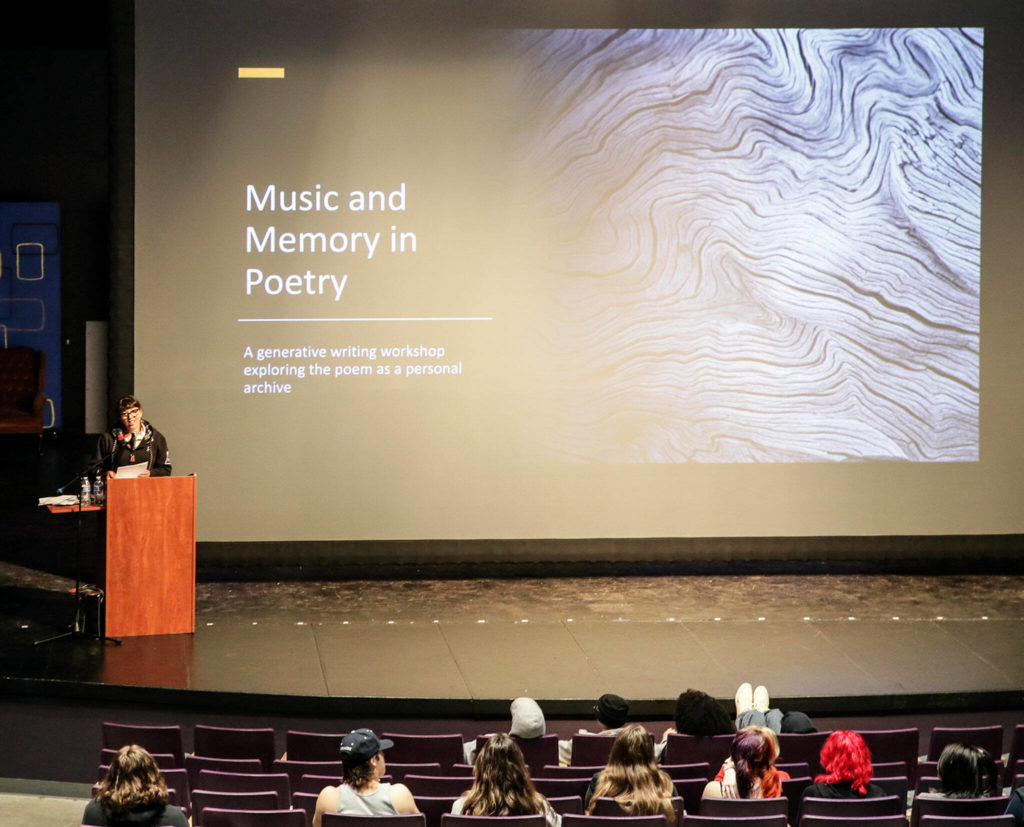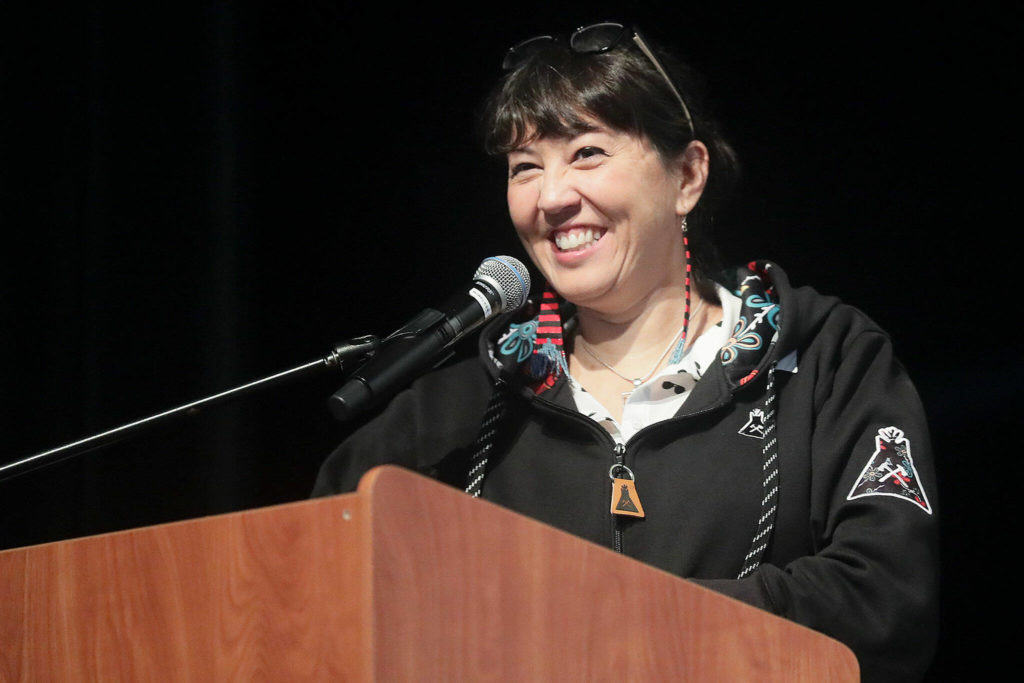LAKE STEVENS — Quiet key clacks from about two dozen Chromebooks melded together in a four-minute symphony on Thursday in Amy Fry’s classroom.
Her Lake Stevens High School students were focused on typing out everything they knew about salmon during a “free writing” exercise led by Rena Priest, the state’s poet laureate. Later, they would shape those thoughts into a different kind of music: poems.
“One of my earliest memories is of my mom reading Dr. Seuss to me, and I loved it,” Priest told a Daily Herald reporter before the writing exercise. “I think the sound of language has always made an impression on me.”
Priest visited the Lake Stevens school at the request of Fry and her colleague, Annemarie Russell. She led writing workshops for dozens of students during one combined lecture for the high school English classes, then three small group sessions in a “Pacific Northwest Literature” course.
“You make (poetry) so accessible to students,” Fry told Priest after her first lecture.
Priest is a member of the Lummi Nation and the first Indigenous person to serve as the state’s poet laureate. Five other writers held the role before her. She lives in Bellingham, where she has taught classes at Western Washington University and Northwest Indian College. She has a master’s degree in writing from Sarah Lawrence College.
As poet laureate, Priest builds awareness and appreciation of poetry throughout the state. Each poet laureate takes on a special project, and Priest focuses her work on celebrating poetry in tribal communities and using writing to better appreciate the natural world and build awareness of what threatens it. Her term lasts through March 2023.
During her visit to the school, Priest read a number of her pieces, including “The Forest for the Trees.” It begins:
“I have seen a tree split in two
from the weight of its opposing branches.
It can survive, though its heart is exposed.
I have seen a country do this too.”
Priest added the “Ballad of Aunt Lottie,” an excerpt from a novel she wrote, as a last-minute switch to her small group workshop when she learned students had started a unit called “Growing Up Wild.” The piece highlights how generations of Indigenous people were affected by the Stevens Treaties, eight agreements signed with tribes in the mid-1800s before Washington became a state. It also ties in contemporary problems, like the disproportionate rate of missing or murdered Indigenous women and the steep decline in orca population.
“The piece about Aunt Lottie was just crazy good,” Lake Stevens senior Kaylie Jansen told the Daily Herald after class. “It was really cool to have the author of something so powerful read it to you.”
Jansen said that listening to Priest’s writing was important because it helps students learn about cultures different from their own. It also teaches students about history. Jansen said she had not heard of the Stevens Treaties before, and “I don’t know much about Native American culture, despite living in Washington.”
Jansen also appreciated learning from Priest, a renowned author, a profession the high school student envisions for herself.
Henry Gonzalez, a senior at Lake Stevens High, said it was great to see diversity represented with invited speakers like Priest. On Thursday, shortly after the other students left the lecture hall, he recited one of his poems to Priest from a handwritten page of paper.
“I think it was great how an Indigenous person came to speak her truth and how her culture. … As a person of color, it made me feel that I am not alone,” said Gonzalez, who wants to write for a living. “I can do this.”
The teachers who helped organize Priest’s visit, Russell and Fry, said they invited her because they wanted to give their students a chance to meet a poet in person. They hoped Priest’s visit might “humanize” writing by showing teenagers that behind every Shakespearean sonnet or Toni Morrison novel is a living, breathing person whose writing is shaped by their emotions and experiences.
Three years ago, the educators designed the “PNW Lit” class to explore how place also influences writers. Instead of reading works by “old white men” based in other areas of the world, the class zeros in on local and contemporary writers “who represent the kids sitting in the classroom,” Russell said.
On Thursday, the women brainstormed ways to incorporate Priest’s poems and writing activities into their class.
“The relationship between a teacher and a text is generative, because we create lessons based on us getting excited,” Russell said. “This visit is a treat for us teachers, too.”
Mallory Gruben is a Report for America corps member who writes about education for The Daily Herald.
Mallory Gruben: 425-339-3035; mallory.gruben@heraldnet.com; Twitter: @MalloryGruben.
Talk to us
> Give us your news tips.
> Send us a letter to the editor.
> More Herald contact information.



























